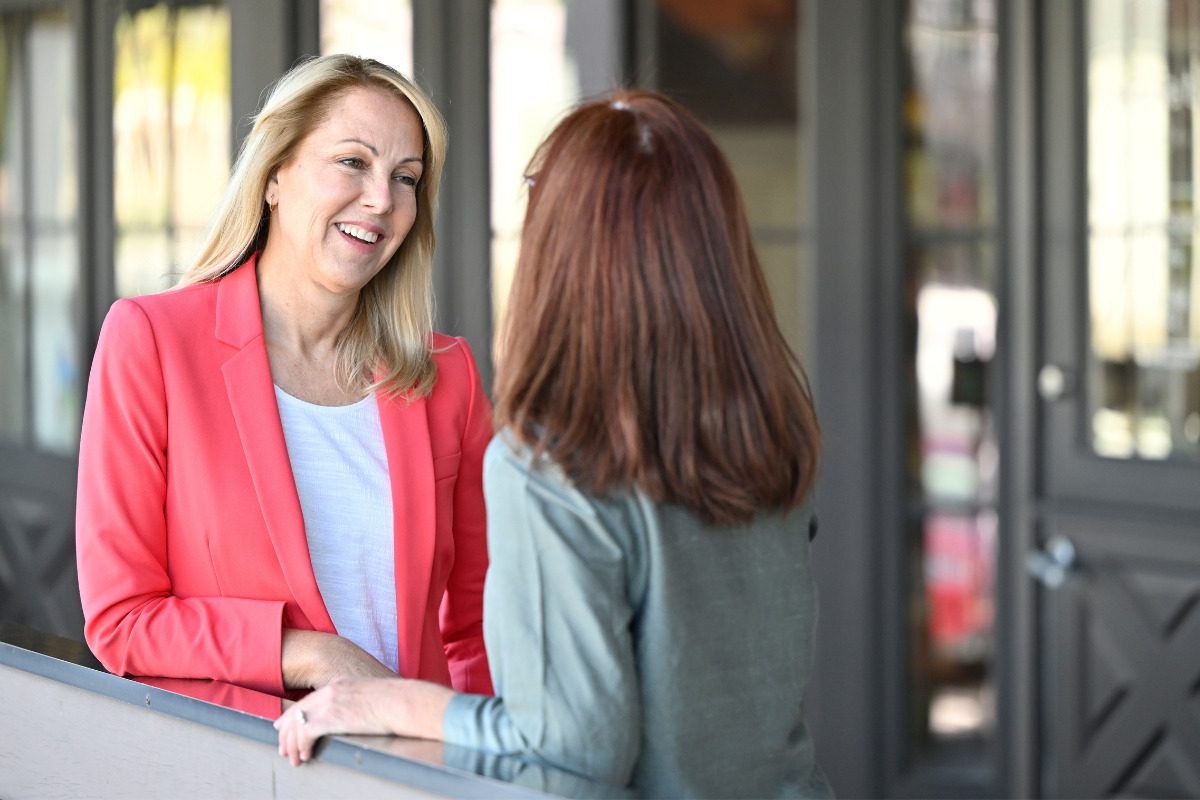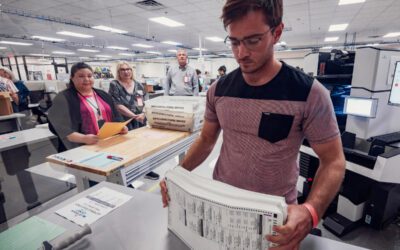
Kelli Butler is running for the House of Representatives in Arizona's 4th Legislative District. Photo courtesy Arizona Democratic Legislative Campaign Committee.
In a year in which seven Arizona Democratic state legislators have quit their jobs in the state House, fleeing in frustration from the Republican-controlled chamber, Kelli Butler is running in the opposite direction.
Butler is one of the Democratic nominees for the Arizona House of Representatives, where should would represent the 4th Legislative District, covering parts of northern Phoenix and Scottsdale.
What on earth keeps her going?
“I want to make sure that people in our district know we have better solutions than what they’re seeing right now,” Butler, a small business owner, mother of two adult sons, and at-large member of the Maricopa Community College Governing Board, told Copper Courier recently.
“We know what people want. They want good schools. They want safe neighborhoods. They want access to health care and reproductive freedom,” Butler added. “Instead, we see our legislators calling for abortion bans, book bans, culture wars—things that just aren’t solving people’s kitchen-table issues.”
Back to the Capitol
Butler served in the House from 2017 to 2022, during which she was the prime sponsor of more than 15 bills each year, most aimed at improving access to health and education. Only a couple of them got a hearing in the Republican-controlled House, and one lone bill was enacted: it allowed proceeds from sales of special license plates to go to an ovarian cancer awareness program.
Republicans are thwarting most efforts by Democrats in swing districts, she says—including LD4—“because they don’t want us to be able to run on our successes.”
Undaunted, Butler figured out ways to lead change outside of the legislative process. Her end runs include helping to inspire Gov. Katie Hobbs’s recent move to expand healthcare access for up to 10,000 Arizona children.
The following conversation has been edited for clarity and brevity.
Copper Courier: What achievement are you proudest of from your last term?
Kelli Butler: As ranking member on the health committee, I learned that Arizona had one of the country’s worst rates of uninsured children—but that as a state, we could raise the eligibility threshold to allow more children to receive comprehensive, affordable care. So every year, I ran a bill (HB 2205) to raise the threshold.
I tried to add it as an amendment to other bills and talked about it constantly, and the Republicans kept shutting me down. But after Democratic Gov. Katie Hobbs was elected, we drew enough attention to the issue that she put that provision in the budget. That means nearly 10,000 children who didn’t have access to care now do.
CC: It looks as though your ability to make noise and convene people as a legislator—at least for now—may have more impact than you could get by sponsoring bills.
KB: That’s right. In another case, to try to increase student safety, I was able to get district and charter school leaders together to share their databases so they can better review applicants—for instance, to prevent a teacher who has been fired from one school from easily transferring to another. They hadn’t been consistently communicating about this before.
I also worked with radiologists and Arizona’s Medicaid program to provide coverage for a higher level of mammogram screening for high-risk patients.
CC: What inspired you to get into politics?
KB: I had never imagined being involved in politics. My husband is a dentist and he and I were owners of his practice, and I just I got involved in my own kids’ public schools and started to see how all the cuts were affecting them. Great teachers were leaving; class sizes were getting bigger and bigger, and I wanted to do something about it. I was elected to the legislature, and then I saw there were so many things we could do to address children’s health, so that also became a big issue for me.
When I was going to school, we had mental health services—counselors, people who were there to help. Now we have the worst counselor-to-student ratio in the country, the fewest counselors to help intervene when children are in crisis. It’s absolutely terrible, but it’s something that we could work to address at the state legislative level.
CC: LD4, which includes North Phoenix and central Scottsdale, is one of Arizona’s few districts represented by both Democrats and Republicans. In this election, you and fellow Democrat Karen Gresham are running against Republican Rep. Matt Gress. What are the main differences between you?
KB: Matt Gress has been in the legislature for two years now. In his first year, he introduced five different bills that were widely considered to be “fetal personhood” bills, which is this kind of sneaky backdoor to establishing that, at the moment of conception, a fertilized egg has the same rights as a pregnant woman.
Those are scary bills; they could lead not only to abortion bans but also to bans on IVF and potentially also contraception. This does not reflect Arizonans’ values. When Democrats managed to get a bill up for a vote to simply protect access to contraception, Matt Gress voted against it. He has clearly demonstrated his lack of concern for women’s reproductive health.
CC: What is your position on Arizona’s gun culture?
KB: We have very lax gun-safety regulation in Arizona, even as the US surgeon general has declared gun violence to be a public health crisis. So it’s a focus of our Democratic caucus to do very commonsense things, like safe storage legislation, so that we can make sure that children don’t have access to loaded weapons in their own homes.
There are things that other states are doing, without taking away people’s Second Amendment rights, to try to make children and make families safer. And we should be doing those things or at least researching reforms that are working in other states.
CC: What keeps you going when so many of your colleagues are giving up?
KB: I’m a native Arizonan and I’m optimistic by nature, and I also believe we finally have an opportunity in this state to come back to the middle to maybe get a tie or even a Democratic majority in the legislature—and that will mean different priorities.
That opportunity runs right through my district in LD4, one of the most competitive districts in this state, so I’m thrilled to be running and have to do everything I can. This could be a really pivotal year for Arizona.
You know, I’ve been knocking on a lot of doors this election cycle, meeting constituents, and I will tell you that Republican women and independent women across the board are not going to stand for an abortion ban. The idea that the government would be telling women what we can and can’t do with our bodies is not going to stand.
So we’re hearing that women know this is a really important election from that standpoint. That’s going to make a difference.
CC: How confident are you that voters will be free to exercise their choice in November?
KB: In the last election, Arizona was ground zero for attacks on democracy. We had a slate of “fake electors” and losing candidates falsely claiming the election was stolen. Meanwhile, Republicans are pushing bills that would create needless barriers to voting.
But I’m confident that our election this year will be carried out well. While Arizona still has election deniers who are trying to sow doubt and mistrust, we are fortunate to have elected officials at different levels, and from both political parties, who are overseeing the election.
These are thoughtful leaders who are working to ensure our elections are accurate and secure. This year, voters need to make sure to elect people at all levels who will continue to protect our right to vote and our democracy.

Republican Rep. Juan Ciscomani wins reelection to Arizona US House seat
Juan Ciscomani won his first term in 2022 when he beat Kirsten Engel by over 5,200 votes. PHOENIX (AP) — Republican Rep. Juan Ciscomani won...

No, Elon Musk did not hack Arizona’s election results with Starlink
Only three Arizona counties use Musk's Starlink, and two of them voted for Kamala Harris. As President-elect Donald Trump begins filling key posts...

Why AP called the US Senate race in Arizona for Ruben Gallego
The AP only declares a winner—in this case, Ruben Gallego—once it can determine that a trailing candidate can’t close the gap and overtake the vote...

Women have led other democracies, but US voters rejected the 2 who tried—what will it take to elect a female president?
In the United States, 45 men have served as president, starting with George Washington in 1789. Donald Trump’s reelection extends that streak....




